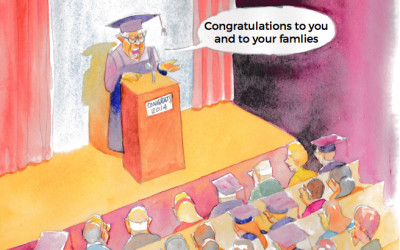
These are increasingly tumultuous times on college campuses.
While anti-war sentiment has not reached anywhere near the fever pitch that it attained during the Vietnam conflict, it is apparent and growing.
In spring 2006, more than 50 silent protesters quietly turned their backs on U.S. Secretary of State Condoleeza Rice as she accepted an honorary degree at Boston College.
It was not nearly as quiet at The New School in New York City where U.S. Sen. John McCain (R-AZ), speaking to graduates at the invitation of his former Senate colleague and current New School president, Bob Kerrey, was booed and heckled by dozens of graduating students and faculty members.
The purpose of this article is not to leap into the debate on the wisdom of the Iraq war, nor to assess the choices of those who use the graduation ceremony as a forum for protest.
The purpose is, however, to honor and remember the troops who have served in Iraq and in all previous armed conflicts.
And in particular, the purpose is to bring to your attention the fact that, in every U.S. conflict, there are current college students who are among those who bravely serve our country and who, in some cases, die heroically in the line of duty.
Of the more than 2,400 military fatalities recorded since the start of the Iraq conflict it is unclear exactly how many of those were current college students.
A scan of news reports reveals that two current college students, on duty as reservists, were both among the earliest casualties in Iraq, killed in the line of duty within weeks of the U.S.-led Iraqi liberation. David T. Friedrich, a University of New Haven graduate student three courses shy of a master’s degree in forensic science, was killed in September 2003, during a time when many observers felt that the war was beginning to wind down.
Now, years later, the conflict continues, as does the uncertainty on college campuses about just how to honor those students who have died.
Some schools have war memorials on their campuses, most built either in the wake of WWI or WWII, and a quick read of those situations reveals that the names of students killed in Iraq are being added to the memorials, though in some cases that will not take place until the war is officially declared over.
At campuses without established war memorials – and that is the case at the vast majority of schools – it is left up to individual decision-makers as to what, if anything, might be done to honor those who lose their lives in the line of duty.
Since every college campus has its own culture and ethos, I find it hard to argue with the basic premise of leaving such matters in the hands of the most appropriate school administrators.
What I do argue with is those administrators who choose to shirk their responsibilities by either failing to make a decision about what the school will – or won’t – do in honor of a fallen student veteran, or who make a decision that is so last-minute and so quiet that even the deceased soldier’s own family members are unaware of the plans or unable to change their schedules in order to attend the planned memorial service.
Such a case has already happened at Western Michigan University in Kalamazoo, Michigan, where Sgt. Matthew Webber’s memorial service, according to his aunt Linda DeBoer, was scheduled without input from his immediate family, and there was no notice of it provided through the student newspaper, Web site or other campus outlets. As a result, only one student, Sgt. Webber’s cousin, attended the ceremony, a poor way to commemorate Sgt. Webber’s ultimate sacrifice for his country.
Between the lines in my reading of the Western Michigan University facts is the underlying reality that schools are concerned about a potential intra-university conflict between students who might show up to honor their dead comrade, and those who might use such a service to express their own views on the wisdom of the conflict in Iraq.
Let the chips fall where they may, and do the right thing. A memorial service for a student killed in combat in Iraq is clearly the right thing to do. Structuring the service so that there is an opportunity for all students to attend is also the right thing. If some students choose to use a memorial service as a venue for politics or protest, then those students should be held accountable for their actions, in accordance with the ethos, the traditions and the code of conduct of that college or university.
The factors which embolden a student or soon-to-be-graduate to protest – loudly or softly – at a college graduation ceremony may not necessarily be at play during a memorial service. However, should this theory prove wrong, then it is still important to remember that the freedoms to protest and, in some cases, to peaceably disrupt are part of what those soldiers are dying for in Iraq to begin with, and that those soldiers, if given a vote, would want all comers, and all points of view, to be seen and heard at a memorial on their college campus.



